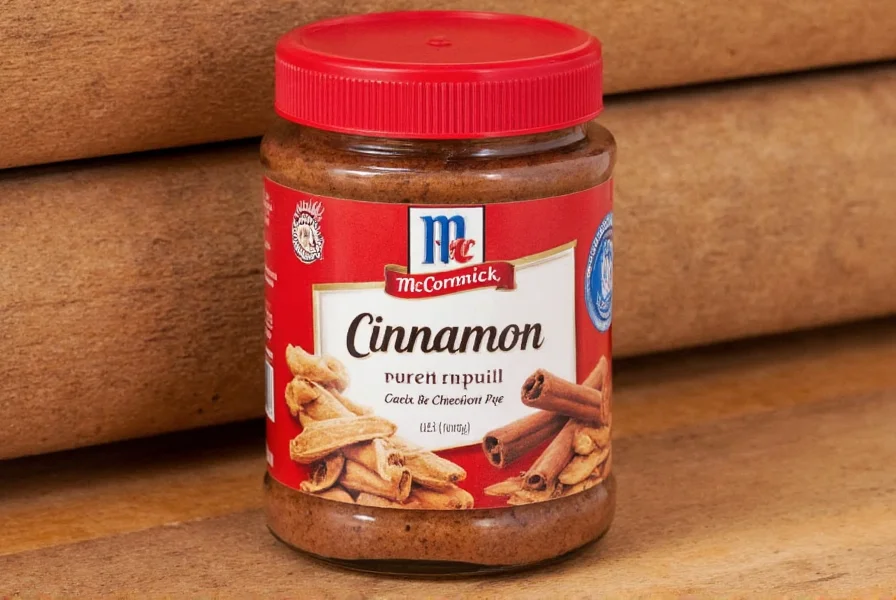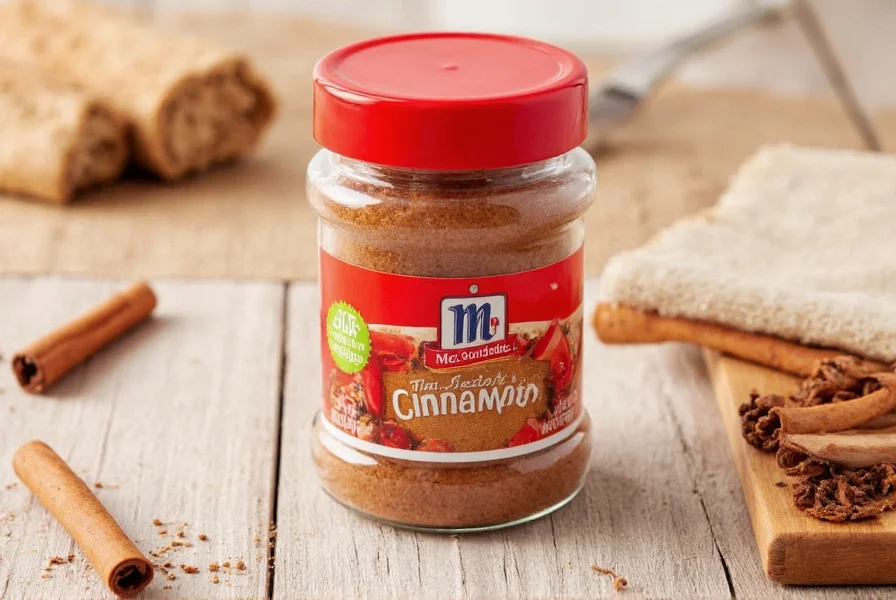When evaluating the safety of any food product, understanding the specific type and composition is essential. McCormick’s ground cinnamon, widely available in grocery stores across North America, consists mainly of Chinese Cassia cinnamon (Cinnamomum cassia). This variety naturally contains coumarin, a compound that in excessive amounts may cause liver issues in sensitive individuals.
Understanding Cinnamon Varieties and Their Safety Profiles
Cinnamon isn't a single uniform product—different varieties have distinct chemical compositions and safety considerations. The two primary types consumers encounter are:
| Cinnamon Type | Coumarin Content | Common Availability | Typical Use Cases |
|---|---|---|---|
| Cassia (Chinese) | 2,000-6,000 mg/kg | Most common in supermarkets | General cooking, baking |
| Ceylon ("True" cinnamon) | 40-100 mg/kg | Specialty stores, health food markets | Supplements, therapeutic use |
McCormick’s standard ground cinnamon product line predominantly features Cassia cinnamon, which explains its stronger flavor profile and darker color compared to the more delicate Ceylon variety. While Cassia contains higher coumarin levels, typical culinary usage—about 1 teaspoon (2-4 grams) per serving—results in coumarin intake well below established safety thresholds.
Coumarin Safety Guidelines and Consumption Limits
Coumarin safety has been extensively studied by food safety authorities. The European Food Safety Authority (EFSA) established a tolerable daily intake (TDI) of 0.1 mg of coumarin per kilogram of body weight. For a 60 kg (132 lb) adult, this translates to 6 mg of coumarin daily.
Research published in the Journal of Agricultural and Food Chemistry indicates that Cassia cinnamon typically contains 2,000-6,000 mg of coumarin per kilogram. This means a standard teaspoon (approximately 2.6 grams) of Cassia cinnamon contains about 5-15 mg of coumarin. While this exceeds the EFSA's TDI in a single serving, occasional culinary use remains within safe parameters for most healthy adults.
McCormick has consistently maintained quality control standards that ensure their cinnamon products meet or exceed FDA and international food safety regulations. The company's testing protocols verify that their products contain no harmful contaminants and maintain consistent quality across batches.
Who Should Monitor Cinnamon Consumption
Certain populations may need to moderate their cinnamon intake, regardless of brand:
- Individuals with pre-existing liver conditions
- People taking medications metabolized by the liver
- Those consuming cinnamon supplements regularly
- Young children with lower body weight
For these groups, consulting with a healthcare provider about appropriate cinnamon consumption is advisable. Those particularly concerned about coumarin might consider seeking out Ceylon cinnamon products, which McCormick also offers in select markets under specialty product lines.
Regulatory Oversight of Cinnamon Products
Food safety agencies worldwide monitor cinnamon products for safety. The U.S. Food and Drug Administration (FDA) regulates cinnamon as a food ingredient with established good manufacturing practices. While the FDA hasn't set specific coumarin limits for cinnamon, they monitor products for safety concerns.
European regulations are more specific, with the European Union setting maximum coumarin levels for different food categories. These regulations ensure that even Cassia cinnamon products available in Europe remain within safe consumption limits when used as intended.
McCormick participates in industry food safety initiatives and adheres to strict quality control measures that exceed basic regulatory requirements. Their products undergo regular testing for contaminants, heavy metals, and other potential safety concerns.

Practical Guidance for Safe Cinnamon Use
Consumers can enjoy McCormick cinnamon safely by following these evidence-based recommendations:
- Use cinnamon in typical culinary amounts (1/4 to 1 teaspoon per serving)
- Avoid consuming large quantities of cinnamon supplements without medical supervision
- Rotate between different spice varieties to diversify your diet
- Store cinnamon properly in airtight containers away from light and heat
- Check expiration dates as freshness affects both flavor and quality
For those specifically concerned about coumarin exposure, incorporating Ceylon cinnamon for regular use while reserving Cassia for occasional recipes requiring its stronger flavor profile represents a practical approach. Many specialty food stores now clearly label cinnamon varieties, making it easier to select based on personal health considerations.

Addressing Common Misconceptions
Several myths circulate about cinnamon safety that deserve clarification. The popular "cinnamon challenge" (consuming a spoonful of dry cinnamon) poses choking and respiratory risks but isn't specifically related to coumarin content. Similarly, concerns about cinnamon causing blood sugar crashes are largely unfounded for typical dietary use, though those with diabetes should monitor their response to any dietary changes.
McCormick's commitment to product transparency includes providing detailed information about their sourcing practices and quality control measures. While they don't typically disclose exact coumarin levels in specific products, their adherence to industry safety standards ensures their cinnamon remains suitable for regular culinary use by the general population.
Is McCormick cinnamon safe for daily consumption?
Yes, McCormick cinnamon is safe for daily consumption in typical culinary amounts. The company's standard ground cinnamon contains Cassia cinnamon with coumarin levels that remain within established safety limits when used in normal cooking and baking quantities (typically 1/4 to 1 teaspoon per serving).
Does McCormick cinnamon contain harmful levels of coumarin?
McCormick cinnamon contains coumarin at levels consistent with other Cassia cinnamon products, but these levels are not considered harmful when consumed in normal culinary amounts. A teaspoon of McCormick's ground cinnamon contains approximately 5-15 mg of coumarin, which exceeds the European Food Safety Authority's daily limit for sensitive individuals but remains safe for occasional use by most healthy adults.
What type of cinnamon does McCormick use in their products?
McCormick primarily uses Chinese Cassia cinnamon (Cinnamomum cassia) in their standard ground cinnamon products, which is the most common variety found in North American supermarkets. They also offer Ceylon cinnamon in select specialty product lines, which contains significantly lower coumarin levels.
How much McCormick cinnamon is safe to eat daily?
For most healthy adults, consuming up to 1 teaspoon (approximately 2.6 grams) of McCormick's ground cinnamon daily is considered safe. Those with liver conditions or taking certain medications may want to limit intake to 1/2 teaspoon or consult their healthcare provider, as Cassia cinnamon contains coumarin which in excessive amounts may affect liver function in sensitive individuals.
Is McCormick cinnamon safe for children?
McCormick cinnamon is safe for children when used in normal culinary amounts in food preparation. However, due to their lower body weight, children have lower coumarin tolerance. Parents should avoid giving children cinnamon supplements or large quantities of cinnamon directly. The small amounts typically used in baking or cooking pose no safety concerns for children.










 浙公网安备
33010002000092号
浙公网安备
33010002000092号 浙B2-20120091-4
浙B2-20120091-4